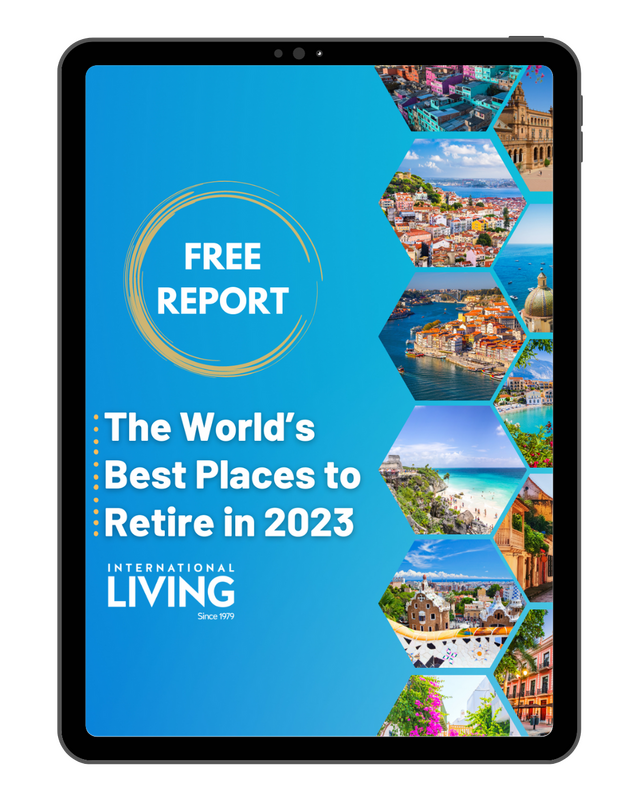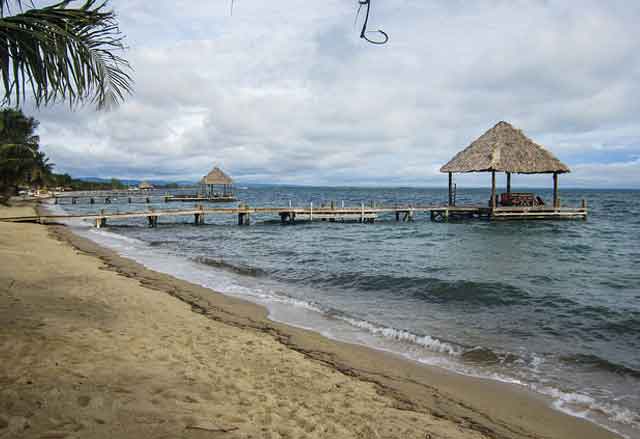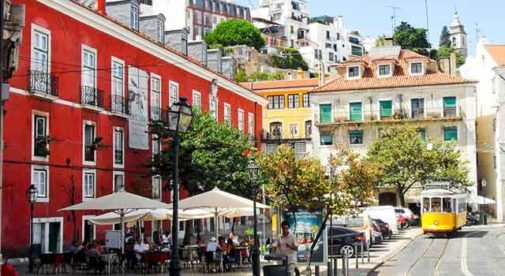Advances in technology have opened up the world. Planes, trains and the Internet are all getting faster and—if you know where to look—you can embrace these changes and make your dream of exploring dozens of overseas destinations come true.
Just ask Diana L. Davis. “I am living what is called a “roving retirement.” In my case, this translates to living in places around the world that cost less than living in the States. These are extended stays for me, usually a minimum of three months…with two suitcases in tow.
“Living this lifestyle does require managing details. The internet makes life much easier now compared to those who began this lifestyle many years ago. Having the internet, means I can communicate with family and friends anytime, and manage my financial life and any other details that arise.”
Right now, living internationally is more affordable than ever before. In fact, done right, it’ll cost you less than it would to stay home.
You can cruise to Europe for up to 70% off standard prices if you know how…you can use a host of websites to organize low-cost, luxurious accommodation for a few months—enough time to try a place on for size—before moving on to the next… You can sit on a terrace overlooking the Mediterranean sipping wine in April, and kick back on a beach in English-speaking Belize in May…just like Christina and Tim Daggett from Maine.
“Traveling is a fountain of youth,” says Christina, as she sits down to dinner with her husband, Tim. It’s evening in the town of Hawick, Scotland, where they are currently staying. “I can’t imagine going back to the States or our old lifestyle. Nothing could be better than what we’re doing now.”
What they’re doing is traveling around Europe on their pension income. They’ve explored 16 countries so far—all on $2,600 a month.
Their life of travel began in 2009. Tim and Christina moved to Ecuador when Tim was offered early retirement from the postal service. “We chose Ecuador after reading about it online,” says Tim. “The cost of living was so low compared to the U.S. The climate was perfect, the landscape beautiful, and we could live there without a car.”
Although happy in Ecuador, the couple thirsted for more adventure. After a couple of years, Tim asked Christina, “If there was a way we could travel through Europe, would you?” Her response was an immediate yes, so they went home right away and started their research.
“When I started reading about Schengen and non-Schengen countries, I realized this was our chance,” says Tim. “We could live in a Schengen country for three months and then move to a non-Schengen country for three months, alternating between the two.” (The Schengen area includes most of the E.U., and U.S. and Canadian citizens can stay in these countries for 90 days out of every 180-day period.)
In 2011 they packed their suitcases and went to Budapest, Hungary. “We got our first place on Craigslist, which can always lead to being scammed,” says Tim. Fortunately, they later discovered Airbnb, which was just starting to gain popularity. “Airbnb was an absolute miracle for us,” says Tim. “We can so easily find an apartment, plan our trips months in advance, and have a secure way to pay.
“Don’t limit your Airbnb search to one specific city like Paris or Rome. Search within a wide area, or even the whole country in general. We shop apartments first by price, and then we look up what city they’re in.”
“By doing things this way, we have found so many lesser known cities that have fewer tourists and have given us a much more authentic experience,” Christina says.
Many of the expats living this globetrotting lifestyle are on a long-term search for the perfect retirement locale. They aren’t in a hurry, or on a schedule. They throw the net wide, visiting dozens of countries and many places within each. They gradually narrow down the contenders to those few locales that have really captured their hearts, while hitting everything on their bucket lists along the way.

Get Your Free Report on the World’s Best Places to Retire:
Learn more about the best places in the world to retire in our daily postcard e-letter.
Simply enter your email address below to sign up for our free daily postcards and we’ll also send you a FREE report on The World’s Top 10 Retirement Havens, plus access to over 10 more free reports. Our gift to you, on our favorite destinations.
You can do the same. Spend two months in Paris, six weeks in Portugal, then try Latin America. Start with the beaches of Belize, move south to the mountains of Ecuador. Create your own extended “colonial-home tour”…three months in the immaculately preserved town of Granada, Nicaragua, followed by a stint among the restored shophouses and art galleries of George Town, Malaysia. (Costs in either place are less than $1,300 a month for a couple, including rent.)

Beyond the adventure, the true beauty of this way of life is the flexibility. A roving retirement like this can be as fast- or slow-paced as you like. Having discovered an enchanting Italian hilltop town, you can linger. If a place appeals, stay longer…if not, move on. And as your first year on the road rolls into your next you’ll have learned where you feel most at home. Instead of two months on your favorite Thai island this time you might decide to spend four… and so on…all the time savoring the best the world has to offer you…
And many roving retirees choose to go it alone. Since retiring two years ago, Vadim Ponorovsky has been traveling non-stop. He has been to Mexico, Costa Rica, Italy, Spain, France, Japan, Thailand, and Vietnam, immersing himself in new cultures and making new friends. “Every day is a new experience. You see something you’ve never seen, you hear something you’ve never heard, and you eat something you’ve never eaten before,” he says.
“Many years ago, at a college party, I said that I would retire at 50.” And he did. When Vadim turned 50, he became a roving retiree. He always loved traveling, but after a successful career owning French restaurants in New York, Vadim is enjoying a more relaxing lifestyle traveling 12 months a year.
Choosing a new destination is easy for him. He says that, if a country is safe, he wants to go there. “Most of my life has been ruled by spontaneity, and my motto is, ‘Let’s see what happens.’ The world is huge and I want to see it.”
Vadim prefers slow travel, staying as long as his tourist visas allow. “I can stay in a European country with a tourist visa for 90 days, six months in Mexico,” he explains. “When I get there, I am not interested in going to the museums but in experiencing life and understanding how people live on a day-to-day basis.”
Vadim’s monthly budget (funded by his investments and savings) is never above $3,000. “I avoid touristy destinations, as they tend to be more expensive. For instance, in France, instead of Paris, I may choose to stay in Lyon.” He also tries to alternate expensive countries with budget-friendly ones. “Last year, I spent quite a bit of time in Europe during the summer, which is the most expensive time there. But I offset it by spending a while in Thailand and Vietnam, which are incredibly inexpensive.”
After choosing his destination and researching visa requirements, Vadim looks for accommodation. “Airbnb is a good way to start. If the prices are reasonable, then I just book for the duration of my stay. If they are more expensive, I book for the first couple of weeks and then try to find something cheaper when I arrive.”
Making friends with locals and expats alike while traveling around the globe has been easy for Vadim. “I am constantly expanding the circle of people that I know around the world. Traveling solo is the best way to make new friends, because you are not tethered to someone and people approach you without hesitation.”
Vadim has no doubts about what has been his favorite place on his adventures so far.
“Thailand has been my favorite, due to the time I spent in Chiang Mai. A place with 600 Buddhist temples is bound to make an impact. I spent days exploring the temples and quite a bit of time chatting with the monks.

“Food is central to my travels. I love it and want to go as native as possible as quickly as possible. And Thailand certainly offers an opportunity to broaden one’s palate. The wide variety of meats and seafood certainly has me counting the days until I’m back.”
Vadim is loving his life as a roving retiree and has a piece of advice for everyone who wants to do the same: “Buy that ticket and just go! I have traveled so many times when a plane ticket was all I had. We only live once.”
Managing Your Finances
Could you really afford to take off to Europe, South America or Asia? At first glance, your balance sheet may not look so promising. But consider: If you rent your house out (or sell it), if you unload your cars and your furniture…you’ll create a pot of cash you may not have considered at first. The money you raise from a yard sale could keep you in a luxury condo in Panama City for a couple of months, or on the road across Europe longer than you think.
Plus, you’ll cut costs from your budget at the same time.
“As I sit at my writing table on my oceanside veranda, staring at the lapping waves of the Pacific, gentle breezes blowing my hair, I am a 65-year-old, extremely happy roving retiree,” says Kathy L. Hall.
“The path I’ve trod across Latin America over the last year or so has been incredibly rewarding. Along the way, I’ve explored lonely expanses of pristine beach, walked cobblestoned colonial streets, and ascended the steps of ancient pyramids. I’ve enjoyed the glorious greenery and spectacular wildlife of tropical rainforests and experienced the warmth of the local people, as well as the camaraderie of fellow travelers of all ages. I’ve made lifelong friends and had adventures I could never have imagined before. And I did it all for just $1,500 a month, all in, including stays in private rooms from just $13 a night and delectable Latin American cuisine for as little as $2. For most of my adventure, I’ve traveled solo, attesting to how safe it can be to navigate this region.
“When I first set off as a roving retiree to Southeast Asia in 2015, I planned to find an affordable place to live and enjoy my retirement. I’d been a working woman all my life and it was beginning to wear on me. I had trouble accepting the idea of working until I died, as living on my Social Security would truly be poverty living in the States.”
How to Travel
When it comes to getting from one place to another, there are all sorts of ways to keep costs to a minimum. Often these tricks and tips will shape how you plan your trip. In Asia, the frequency of cheap flights might mean making your nest near a good airport and traveling regularly from there makes the most sense. In Europe, car rental could prove more economical than rail or flights, not to mention more flexible, allowing you to visit places off-the-beaten track.
Saving significantly doesn’t mean you have to sacrifice comfort or style. Michael and Virginia Zullo are just two of those who have learned the secret of repositioning cruises. “We found out that cruise lines repositioned their ships at the end of one season—moving them to another location for the next season,” says Michael. “They sell off the cabins for these legs of the voyage very cheaply and, if you’re in the right place at the right time, you can get a bargain. We traveled from the U.S. to Europe for a third-off normal prices. One of the big benefits of these cruises is that, not only do you get the transportation, but all your living expenses are covered.”
One bit of advice though, says Michael, “Never take the shore excursions that the cruise ships offer. You can do it yourself for about a quarter of the price.”
When it comes to flying, it’s easy to get overwhelmed by the sheer variety of websites you can book through…and the number of ways you can save. But perhaps the easiest way to get the best deal is by carefully planning when you book your flight.
The price of a flight can fluctuate daily, or even hourly. Airline ticket prices—like all prices—are based on demand, not value. To get the best deals you just need to buy your ticket when no one else is buying theirs—that’s when demand is lowest. By booking early in the morning or late at night, especially late on Wednesdays and Saturdays you will often save money.
And when you travel also comes into play. Early morning and red-eye flights are the cheapest flights on most routes, but it’s probably not worth saving $30 to lose a whole night’s sleep. Prices peak at the beginning and end of business hours, so try booking a flight around midday, when business travel is less popular. The time of year also matters. When you can, avoid school vacations and public holidays.
Sourcing Short-Term Homes
“We use Vrbo.com and Homeaway.com for lodging, because they offer an enormous range of accommodation worldwide,” says Lynne Martin. “We’ve always found their properties reliable. They are available in a wide range of prices in almost every country. We rely on former renters’ reviews to form our opinions. And in places where it makes sense, we look for off-season bargains, when owners are willing to come down in price.”
Folks who rent out their second homes are most likely to bargain with you when it comes to off-season deals. So if you’re not finding the affordable short-term rental you’re looking for, read well into the details about a property to divine whether it’s used as a vacation rental (as opposed to being the owner’s primary residence). If it is, they may assume very low returns in the off-season and be quite happy to negotiate with you to have any income coming in at all.
Another option? Pay no rent at all. Johanne Sauve and Doug Dyer from Vancouver have been exploring Latin America through Housesitting.
“Right now, my husband Doug and I are living rent-free in a four-bedroom luxury villa overlooking the Caribbean. From our veranda, we have a 300-degree view of the colorful homes dotting the hillsides of our island home. Our days are spent mostly lounging around the infinity saltwater pool, making sure the pets get everything they need. A small price to pay for such a great lifestyle.
“It’s a far cry from the life we left behind in Vancouver. In 2015, with Doug approaching retirement age, we began to consider a move to a more affordable country, where the sun would shine every day and we could shed our winter clothes. Barefoot on the beach sounded much better than shivering in the Canadian winters.
“That year, we explored Ecuador and fell in love with the small coastal village of San Clemente. We planned to return in January 2016. But when it was time to book our trip, a serious El Niño was predicted for Ecuador, so we decided to explore Nicaragua, instead.
“Just days before our plane was scheduled to leave, we saw a request for a four-and-a-half-month house/pet sit on the rim of a volcano at Laguna de Apoyo. The home was in the jungle, with unobstructed views of Lake Nicaragua. I could picture myself having my morning coffee, rocking with a cat curled up on my lap.
“Doug responded to the homeowner and set up a Skype call. They were eager to meet us, so I added Laguna de Apoyo to our itinerary. The four of us had a couple of visits and hit it right off. Like that, Doug and I were on our way to our first housesit.”
This growing trend sees homeowners worldwide use sites like Housecarers.com and Trustedhousesitters.com to find someone to live in their home, and perhaps take care of their pets or plants while they are away. Owners gain security and the comfort of knowing somebody will be on hand if anything should go wrong. And in return for minding the home, you get a unique travel experience, become locals in a new part of the world, and meet people you never would have otherwise. There are even luxury offerings. For $10 a year you can join Luxuryhousesitting.com.
How to Live Low Cost
Once you’ve arrived and have a roof over your head, that’s when the fun really begins. The secret to daily savings is simple: Live like a local. If you treat your three months in Provence, France, or Ecuador’s highlands like a vacation, it’s going to cost you accordingly. So avoid restaurants in tourist areas with English on the menus. They’ll cost more (and, often, are not as nice).
Instead, seek out local markets and stores. This isn’t a hardship, in fact it is part of the fun and often makes for a richer experience. “We’re always on the lookout for local fairs, flea markets and farmers’ markets,” says Lynne Martin. “Not only do we find great bargains, but we get a chance to absorb the real flavor of a country. We’ll ask people we meet along the way to guide us to grocery stores where they shop, so instead of seeking out places to buy familiar American foods, which are always much more expensive, we try to learn to cook like the locals. It’s more fun and a challenge, too!”
The same goes for staying in touch. “We buy pay-per-use disposable phones in each country we visit, because it’s much more cost-effective than U.S. phone plans,” says Lynne. IL International Executive Editor, Eoin Bassett, renting short-term in Panama, says a local cell phone cost him just $20. And when it comes to staying in touch with the folks back home and sharing your adventures, Skype, Facebook and email are all free with an Internet connection.
In European cities, public transport is easy and inexpensive. Metro and underground services, 24-hour buses, bike-rental plans—even city car-share schemes—give you lots of options. In Latin America, taxi travel is cheap, but consider car rental if you’re in town for more than a few weeks as it might be more economical.
Where to Go?
Armed with a strategy for good-value living, your next order of business is to figure out where you want to go. A lot depends on how you choose to travel and to source your accommodation. Take your wish list of destinations, choose a country or region, and begin exploring your options. Don’t rule out a place because you assume it’s expensive…chances are high that—using the strategies we’ve laid out here—you can do it more affordably than you may think.
There is no one “right” way to plan a “moveable retirement.” Yvonne and Michael Bauche found their European adventure grew organically as they arranged different house sits. “Apart from arranging a vehicle in advance, we kept everything as flexible as we could,” says Yvonne. “The plan for Central America was start in Belize and work south to Panama. Internet access is crucial for researching and planning as we travel.
“How do we plan our next move? We pick an area such as Central America and research places that we have heard about from International Living, travel guides or fellow travelers and expats. Then we choose our starting point and general direction of travel, visiting as many of the places on our list as we can. If we like what we see and feel, we spend more time there.”
Others approach planning in a long-term way. Lynne and Tim Martin like to plan far ahead so as to arrange the best deals and budget accordingly.
However you approach the planning, there’s no question that spending extended time in different places is more than just a wonderful adventure, it’s the ideal way to research a potentially permanent retirement home. When you shop at the local markets, take note of prices, explore neighborhoods on foot or using local transport…you get a much more realistic sense for a place than you ever could breezing through as a tourist. This way, you say hello to the neighbors, meet local expats and pick their brains, look at notice boards, talk to real estate agents, and generally get curious about everything…in short, you pretend you live there fulltime.
Then ask yourself how you feel. Do you feel safe and comfortable, do you like the area, the food, and the people? Is there anything that you do not like or something that irritates you to a degree that you couldn’t tolerate it over the long-haul?
Yvonne puts it well when she says, “We weigh all the pros and cons, but ultimately it is how we feel that weighs our decision as to whether this could be the place for our ideal abode.”
Keep in mind: Internationalizing your life needn’t be an all-or-nothing endeavor. Take six months or a year and let your wanderlust lead you. Maybe you’ll find the destination of your dreams. Or maybe you’ll simply have the time of your life. Either way, go. The world is full of opportunity and the promise of adventure and you needn’t spend millions to capitalize on either.
Related Articles
Infographic: A Comfortable Retirement Overseas…Without the $1 Million Price Tag
Cheapest Places to Live in the World
Schengen Visa: What Countries are in the Zone

Get Your Free Report on the World’s Best Places to Retire:
Learn more about the best places in the world to retire in our daily postcard e-letter.
Simply enter your email address below to sign up for our free daily postcards and we’ll also send you a FREE report on The World’s Top 10 Retirement Havens, plus access to over 10 more free reports. Our gift to you, on our favorite destinations.

